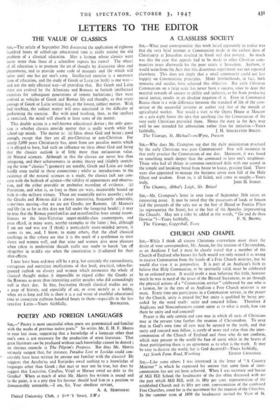POETRY AND FOREIGN LANGUAGES
SIR,—" Poetry is most successful when poets are grammatical and familiar with the works of previous native poets." So writes Mr. E. H. F. Morris in your last issue, suggesting that a knowledge of a language other than one's own is not necessary for the production of great literature. That great literature can be produced without such knowledge cannot be denied ; an obvious example is The Pilgrim's Progress. But does Mr. Morris seriously suggest that, for instance, Paradise Lost or Lycidas could con-
s ceivably have been -written by anyone not familiar with the classics? He suggests that Aeschylus and Euripides owed nothing to a knowledge of languages other than Greek ; that may or may not be true, but does he suggest that Lucretius, Catullus, Virgil or Horace owed no debt to the Greeks? When so much of what Mr. Morris has written is sound and to the point, it is a pity that his fervour should lead him to a position so demonstrably untenable.—I am, Sir, Your obedient servant,
A. A. MARTINEAU
United University Club, i Si" f Street, S.W.r


































 Previous page
Previous page